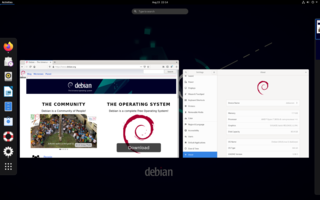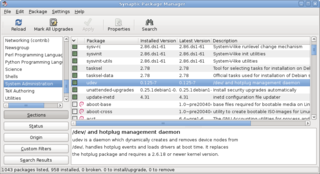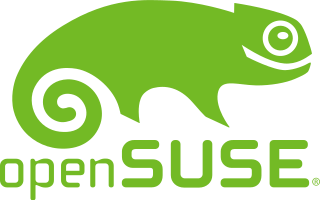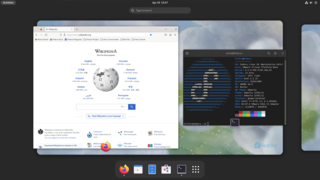
Debian, also known as Debian GNU/Linux, is a Linux distribution composed of free and open-source software, developed by the community-supported Debian Project, which was established by Ian Murdock on August 16, 1993. The first version of Debian (0.01) was released on September 15, 1993, and its first stable version (1.1) was released on June 17, 1996. The Debian Stable branch is the most popular edition for personal computers and servers. Debian is also the basis for many other distributions, most notably Ubuntu.

Slackware is a Linux distribution created by Patrick Volkerding in 1993. Originally based on Softlanding Linux System, Slackware has been the basis for many other Linux distributions, most notably the first versions of SUSE Linux distributions, and is the oldest distribution that is still maintained.

A package manager or package-management system is a collection of software tools that automates the process of installing, upgrading, configuring, and removing computer programs for a computer in a consistent manner.

Advanced package tool, or APT, is a free-software user interface that works with core libraries to handle the installation and removal of software on Debian, and Debian-based Linux distributions. APT simplifies the process of managing software on Unix-like computer systems by automating the retrieval, configuration and installation of software packages, either from precompiled files or by compiling source code.
dpkg is the software at the base of the package management system in the free operating system Debian and its numerous derivatives. dpkg is used to install, remove, and provide information about .deb packages.

The Yellowdog Updater, Modified (YUM) is a free and open-source command-line package-management utility for computers running the Linux operating system using the RPM Package Manager. Though YUM has a command-line interface, several other tools provide graphical user interfaces to YUM functionality.

Portage is a package management system originally created for and used by Gentoo Linux and also by ChromeOS, Calculate, Sabayon, and Funtoo Linux among others. Portage is based on the concept of ports collections. Gentoo is sometimes referred to as a meta-distribution due to the extreme flexibility of Portage, which makes it operating-system-independent. The Gentoo/Alt project was concerned with using Portage to manage other operating systems, such as BSDs, macOS and Solaris. The most notable of these implementations is the Gentoo/FreeBSD project.
urpmi is a package management tool for installing, removing, updating and querying software packages of local or remote (networked) media. It wraps around the RPM Package Manager in the role of a smart package manager. It uses repositories and will resolve dependencies so that the user will not suffer from dependency hell that can happen when using RPM directly. It works with official sources from Mandriva or unofficial sources such as those from the Penguin Liberation Front. It has a graphical front-end: Rpmdrake.

Synaptic is a GTK-based graphical user interface for the APT package manager used by the Debian Linux distribution and its derivatives. Synaptic is usually used on systems based on deb packages but can also be used on systems based on RPM packages. It can be used to install, remove and upgrade software packages and to add repositories.
up2date, also known as the Red Hat Update Agent, is a tool used by older versions of Red Hat Enterprise Linux, CentOS and Fedora Core that downloads and installs new software and upgrades the operating system. It functions as a front-end to the RPM Package Manager and adds advanced features such as automatic dependency resolution. The file /etc/sysconfig/rhn/sources specifies where up2date will search for packages.

PCLinuxOS, often shortened to PCLOS, is an x86-64 Linux distribution, with KDE Plasma Desktop, MATE and XFCE as its default user interfaces. It is primarily free software operating system for personal computers aimed at ease of use. It is considered a rolling release.
Dependency hell is a colloquial term for the frustration of some software users who have installed software packages which have dependencies on specific versions of other software packages.

ALT Linux is a set of Russian operating systems based on RPM Package Manager (RPM) and built on a Linux kernel and Sisyphus package repository. ALT Linux has been developed collectively by ALT Linux Team developers community and ALT Linux Ltd.

VectorLinux, abbreviated VL, is a Linux distribution for the x86 platform based on the Slackware Linux distribution, originally developed by Canadian developers Robert S. Lange and Darell Stavem. Since version 7 the Standard Edition is also available for the x86-64 platform, known as VLocity64 7.

openSUSE is a free and open source RPM-based Linux distribution developed by the openSUSE project.
A software repository, or repo for short, is a storage location for software packages. Often a table of contents is also stored, along with metadata. A software repository is typically managed by source or version control, or repository managers. Package managers allow automatically installing and updating repositories, sometimes called "packages".

Fedora Linux is a Linux distribution developed by the Fedora Project. It was originally developed as a continuation of the Red Hat Linux project and it contains software distributed under various free and open-source licenses and aims to be on the leading edge of open-source technologies. It is now the upstream source for Red Hat Enterprise Linux.
ZYpp is a package manager engine that powers Linux applications like YaST, Zypper and the implementation of PackageKit for openSUSE and SUSE Linux Enterprise. Unlike some more basic package managers, it provides a satisfiability solver to compute package dependencies. It is a free and open-source software project sponsored by Novell and licensed under the terms of the GNU General Public License v2 or later. ZYpp is implemented mostly in the programming language C++.

RPM Package Manager (RPM) is a free and open-source package management system. The name RPM refers to the .rpm file format and the package manager program itself. RPM was intended primarily for Linux distributions; the file format is the baseline package format of the Linux Standard Base.












